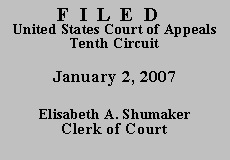

| UNITED STATES OF AMERICA, |
|
| v. | |
| DEAN RAMIREZ, |
I. Background
On May 1 and May 15 of 2003, Ramirez was indicted by a federal grand jury for his involvement in two drug trafficking cases. The cases were consolidated for trial and, after an 8-day trial in March 2004, Ramirez was convicted on four counts: conspiracy involving 500 grams or more of methamphetamine; possession of a firearm by a restricted person; unlawful transport of firearms; and use of a communication facility in a drug trafficking crime. Ramirez was sentenced to 30 years of imprisonment, followed by five years of supervised release. He subsequently appealed his conviction and sentence to this Court, United States v. Ramirez, Nos. 05-4099 and 05-4103. Oral argument was held on March 7, 2006 but a final decision has not yet been rendered.
On March 10, 2006, Ramirez filed a Rule 60(b) motion under the federal civil rules in district court seeking relief from his criminal judgment on the basis of alleged sentencing errors.(1) Before ruling on the motion, the district court asked Ramirez whether he would rather have his claim construed as a petition for a writ of habeas corpus under 28 U.S.C. § 2255 rather than a Rule 60(b) motion. Ramirez replied that he would not, and subsequently filed a memorandum in support of his Rule 60(b) motion.
On May 31, 2006, the district court issued an order denying Ramirez's motion on the basis that Rule 60(b) motions are limited in scope to civil actions. The district court concluded Rule 60(b) "is inapplicable to criminal cases and, as a procedural matter, does not provide Mr. Ramirez an avenue to pursue the relief he now requests." District Court Order at 1. Thus, the court found it lacked jurisdiction to address the merits of Ramirez's claim and denied the motion.
II. Analysis
We agree with the district court that Rule 60(b) provides no basis for the requested relief. First, Rule 60(b) does not apply to a criminal proceeding. United States v. Mosavi, 138 F.3d 1365, 1366 (11th Cir. 1998) (per curiam) ("Rule 60(b) simply does not provide for relief from judgment in a criminal case."); United States v. O'Keefe, 169 F.3d 281, 289 (5th Cir. 1999) (same)).
Moreover, given that an appeal of Ramirez's conviction and sentence is currently pending in this Court, the district court has already been divested of jurisdiction over related issues and Rule 60 cannot be used to circumvent a failure of jurisdiction. United States v. Prows, 448 F.3d 1223, 1228 (10th Cir. 2006). See also Griggs v. Provident Consumer Discount Co., 459 U.S. 56, 58 (1982) ("The filing of a notice of appeal is an event of jurisdictional significance--it confers jurisdiction on the court of appeals and divests the district court of its control over those aspects of the case involved in the appeal."). Finally, Rule 60(b) is not an independent source of jurisdiction in a criminal case.
In short, Rule 60(b) of the Federal Rules of Civil Procedure does not confer jurisdiction on the district court when the existence of a prior pending appeal has transferred jurisdiction to the circuit court.
III. Conclusion
For the foregoing reasons, we AFFIRM the district court's denial of Ramirez's Rule 60(b) motion and DISMISS this appeal.
Entered for the Court,
Timothy M. Tymkovich Circuit Judge
*. This order and judgment is not binding precedent except under the doctrines of law of the case, res judicata and collateral estoppel. It may be cited, however, for its persuasive value consistent with Fed. R. App. P. 32.1 (eff. Dec. 1, 2006) and 10th Cir. R. 32.1 (eff. Jan. 1, 2007).
**. After examining the briefs and the appellate record, this three-judge panel has determined unanimously that oral argument would not be of material assistance in the determination of this appeal. See Fed. R. App. P. 34(a); 10th Cir. R. 34.1(G). The cause is therefore ordered submitted without oral argument.
1. See Fed. R. Civ. P. 60, "Relief from Judgment or Order." A Rule 60(b) motion seeks relief from a final judgment on the basis of mistake, inadvertence, excusable neglect, newly discovered evidence, fraud, or "any other reason justifying relief from the operation of a judgment."